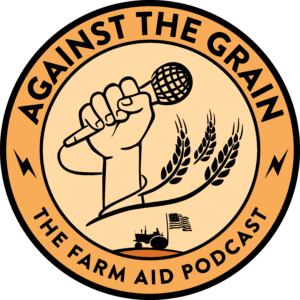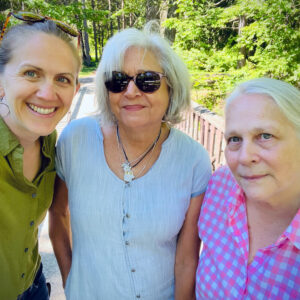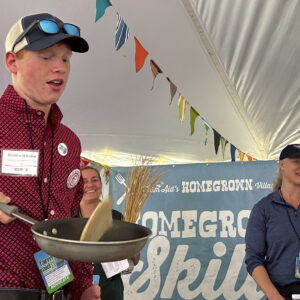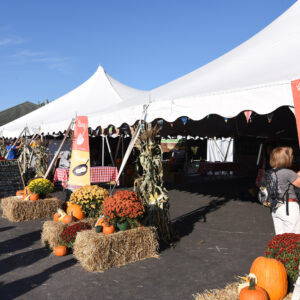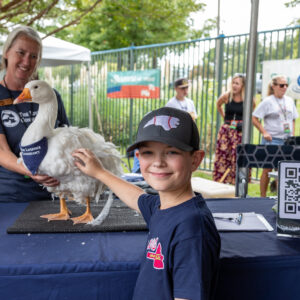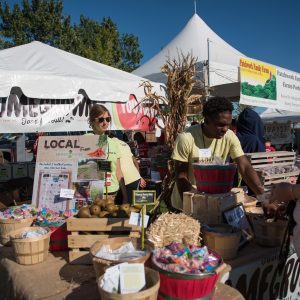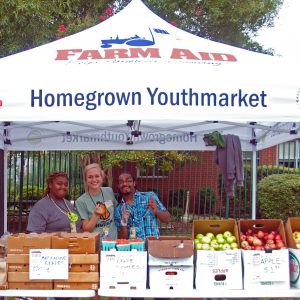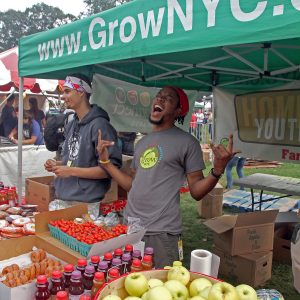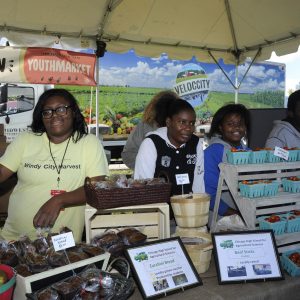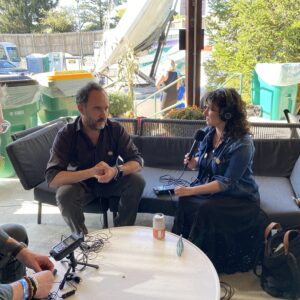On this episode of Against the Grain, we’re bringing you as close as possible to an actual taste of the Farm Aid festival: We’re talking about the mind-blowing, family farm food that festivalgoers eat each year at Farm Aid!
Our guests are Farm Aid’s Associate Director, Glenda Yoder and our Culinary Director, Sonya Dagovitz who, together, established HOMEGROWN Concessions® in 2007. As Farm Aid moves around the country every year, Glenda and Sonya (and now too Business and Marketing Director, Anna Mulè) swap out the food normally served at the venue for food sourced from family farmers who follow specific ecological standards and who get paid a fair price. The food is the best food you’ll ever get at a live event, and it’s changing the live music industry. Hear from Farm Aid board artist Dave Matthews on HOMEGROWN Concessions® too! We also talk to Chef Michel Nischan of Wholesome Wave who, with former USDA undersecretary Gus Schumacher, pioneered using food stamps (now called SNAP benefits) to buy family farm fruits and vegetables – proving that all Americans, regardless of income level, want good quality food. In this episode, farmers and eaters unite!
Listen to the episode below. And, make sure to subscribe in your podcast app of choice!

Glenda Yoder
With a background in community organizing, social change and hospitality, Glenda has led Farm Aid’s earned revenue enterprises and its program area called Promoting Food from Family Farms. Through experiential marketing and culture building, Farm Aid engages the music business, corporate sponsors, foodservice and merchandising as enterprises to expand the reach and impact of the mission and bring Farm Aid values to life.
HOMEGROWN was launched in 2007 to connect eaters with farmers who are leading the way in production practices that care for the soil and water. HOMEGROWN Concessions® criteria require that ingredients are sourced from family farmers utilizing ecological practices and who are paid a fair price, all served on compostable service ware. These practices have made Farm Aid a leader in music event sustainability and attracted many regenerative, natural and organic food companies as part of a network of farmer supply. The HOMEGROWN Youthmarket adds the fresh food component of a farm stand staffed by young people. HOMEGROWN Village invites hands-on participation with seeds, soil, water, energy, skill-sharing and farmers to engage festival goers in the cultures of agriculture.

Sonya Dagovitz
Sonya Dagovitz is President of Natural Needs LLC, specializing in sustainable foodservices, event marketing, fundraising and consumer outreach & education. Sonya is a founding board member of The Organic Center, serving as board chair and development chair. She also was a founding board member and VP of M.O.S.E.S (Midwest Organic and Sustainable Education Services); president of The Chicago Vegetarian Society; on the marketing committee of The Organic Trade Association (chairing their Organic Harvest Task Force). She is the Culinary Director for Farm Aid.
Determined to create better menu options for fellow students while attending Shimer College, Sonya formed her first buying club in 1972. She co-founded The Sprout Shop Co-op in 1979; opened The Pure Food Market in 1989 (the first “organic only” retail store of its kind in the Midwest, using compostable and recyclable service ware while composting and recycling all waste); organized an original distribution site for Angelic Organics Community Supported Agriculture farm; is a self-trained natural foods chef and was a managing partner of the Chicago Diner, LLC in Highland Park, Illinois.
Mothers & Others for Livable Planet recruited Sonya to be Midwest coordinator of their Shopper’s Campaign for Better Food Choices, in 1995. The campaign successfully integrated organic and natural foods into mainstream supermarkets and spawned both a consumer activists guide: The Green Food Shopper, and retailers guide for FMI: A Retailer’s Guide to Natural Foods and Related Products.
Sonya Dagovitz is a single mother of five children, grandmother of three and lives in Highwood, Illinois.
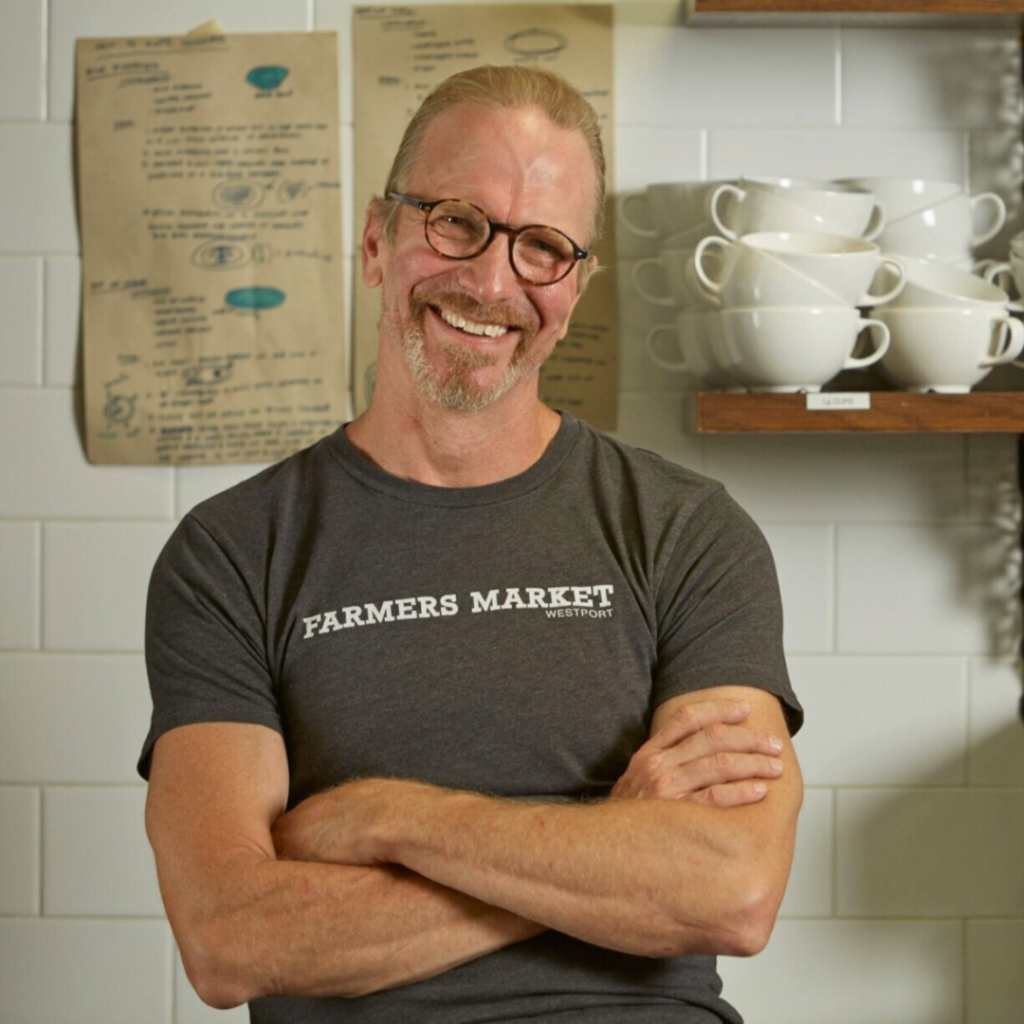
Chef Michel Nischan
Chef Michel Nischan is a four-time James Beard award winning chef with over 40 years of leadership advocating for a more healthful, sustainable food system. A lifetime Ashoka Fellow, Chef Michel co-founded the James Beard Chefs Boot Camps for Policy and Change and serves as a Founding Director on the board of the Jacques Pepin Foundation. He has written three cookbooks on healthful and sustainable food; opened restaurants with the Marriott, Starwood, and Taj Hotels; co-founded the former Dressing Room Restaurant with the late actor Paul Newman; and has been featured on Oprah, the Rachael Ray Show, and other chef-driven television programs. Most recently, he received the President’s Council on Sports, Fitness & Nutrition’s 2024 Lifetime Impact Award in recognition of his extraordinary career and relentless commitment to improving food equity and nutrition across the U.S.
In 2007, Chef Michel co-founded the food equity nonprofit Wholesome Wave in partnership with the late Undersecretary of Agriculture, Gus Schumacher, and with grant funding from his late partner, Paul Newman. He then founded Wholesome Crave in 2018, a plant-based soup company that directly funds the systems-changing work of Wholesome Wave.
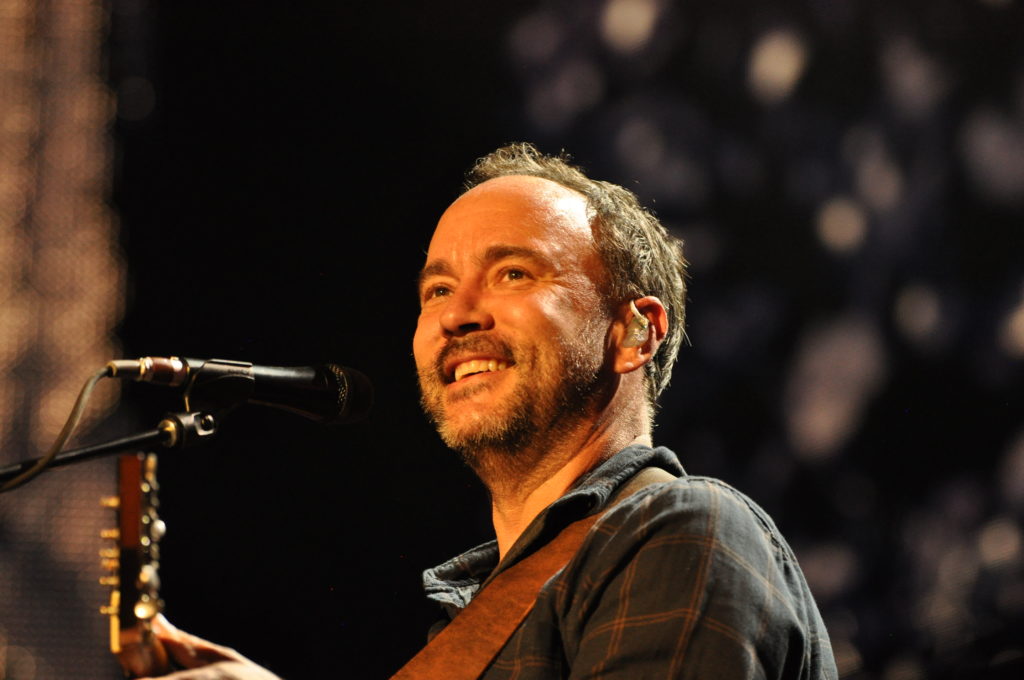
Dave Matthews performs at Farm Aid 2022. Photo © Sharon Carone
Dave Matthews
With a career spanning over 30 years, Dave Matthews Band is one of the most influential bands in rock history. In 1991, vocalist/guitarist Dave Matthews decided to put some songs he had written on tape and sought the assistance of drummer Carter Beauford and saxophonist LeRoi Moore, who were both accomplished jazz musicians in the local Charlottesville, VA music scene. 16-year-old bassist Stefan Lessard came on board shortly thereafter. Their infectious, distinctive sound garnered lots of early attention and a die-hard loyal fan base, catapulting the band into one of the most successful touring acts of the past three decades. The band has sold more than 25 million tickets since its inception, making them the second largest ticket-seller in history.
The band will release their 10th studio album, Walk Around the Moon, May 19, 2023 on RCA Records. To-date, their nine studio albums and numerous live recordings, have sold a collective 38 million CDs and DVDs since the 1994 release of its major label debut, Under the Table and Dreaming. The GRAMMY®-winning band’s many hits include “What Would You Say,” “Crash Into Me,” “Too Much,” “Everyday,” “American Baby,” “Funny The Way It Is,” “Mercy” and “Samurai Cop (Oh Joy Begin).” The latest single from the new album “Madman’s Eyes” was released January 24, 2023.
The group’s Bama Works Fund, established in 1999, has raised more than $65 million dollars for humanitarian and environmental initiatives. Dave Matthews’ ongoing partnership with The Nature Conservancy has resulted in three million trees being planted since 2020. The continued partnership will bring the total to four million trees in 2023. Named as a UN Environment Goodwill Ambassador in 2019, Dave Matthews Band has a long history of reducing their environmental footprint, going back to their first shows in 1991.
Watch Videos Featured in this Episode
Dave Matthews & Tim Reynolds perform “Satellite” at Farm Aid 2023 in Noblesville, Indiana, at Ruoff Music Center, on September 23.
Farm Aid board member Dave Matthews speaks about defending family farmers and bringing new farmers to the land. Backstage at Farm Aid’s 2019 festival in Wisconsin, he also talks about the effect our HOMEGROWN Concessions® has on farmers and festivalgoers alike.
Learn about HOMEGROWN Concessions®
Against the Grain episode 6: Connecting Farmers and Eaters
FOLEY: Welcome back to another episode of Against the Grain. The Farm Aid podcast that brings conversations from farmers organizers and artists to your ears. Just like we do at our annual festival. I’m Michael Stewart Foley.
KURN: And I’m Jessica Ilyse Kurn. On this episode of Against The Grain, we’re bringing you as close as possible to an actual taste of the Farm Aid Festival because we’ll be talking about the mind blowing food. That festival goers get to eat each year at Farm Aid.
FOLEY: That’s right. This year’s festival takes place in Saratoga Springs on September 21st. It’s a festival because the entire venue is transformed from the food to the decor to the activities. There’s a hands on area that we call the HOMEGROWN Village with exhibitors and people doing demonstrations about food and agriculture, making art, engaging people about farming, food, soil and water. And one of the best parts is that we offer a completely new food menu sourced from family farms. It’s pretty much the best food you’ll ever eat at a major venue like this.
KURN: Uh Hard agree. I always am amazed at the food offerings. It’s not easy to swap out the food for family farm food in the live entertainment industry or any industry like it. Think about how many people attend a concert or say an NBA game. That’s a lot of food and feeding that many people has traditionally relied on an industrial food supply chain. That being said, our guests on this episode are the people who make it happen at Farm Aid every year. They came up with the idea and have been trailblazers ever since.
DAGOVITZ: Hi, my name is Sonya Dagovitz and I’m the culinary director for Farm Aid.
FOLEY: Sonya is based in Chicago. And before she came to work with Farm Aid had a long history of activism and advocacy in the local food movement.
DAGOVITZ: In the beginning, the obstacle was access. We just didn’t have access to the foods, these foods as easily. They weren’t in mass market, they weren’t in grocery, they were in co-ops. There were buying clubs and small little co-ops. There were small warehouses or there were people who were trying to find this food and locate it. But in order to be able to provide it for an entire community, it needed to be seen in the areas where most people shopped for me.I had a natural food co-op in my garage for 25 years, raising my five children in my family, but my next door neighbor was not gonna shop in my garage. It just wasn’t going to happen – she would shop in the grocery store. So the obstacle of access turned into how to get the food into the store. Um how to get it to a place where the customer could see it and touch it and taste it back then. Farmers markets were around, but they weren’t as massive as they are today.
KURN: Local food and small co-operative food buying clubs are great for neighborhoods. But again, at each Farm Aid Festival, we’re feeding many thousands of concertgoers, artists, production crew and volunteers procurement at this scale is no easy task. Farm Aid found Sonya when she was up for this challenge.
FOLEY: That’s right after the garage co-op, Sonya got involved with organic foods and as Earth Day grew, she worked to provide local food services to Chicago’s Earth Day celebrations. When Farm Aid had to get food service set up quickly for the artists and small army of crew and volunteers for Farm Aid 1997 in Chicago, the organization turned to Sonya and that’s when Sonya met Glenda Yoder. Farm Aid’s associate director.
DAGOVITZ: They knew to call me and I was happy to do the food service, but I wanted to bring to the table, those sort of um ecological values into the food service. And so we met and we talked and we brought a lot of food, uh donated food products in from that industry. And we asked, would that be ok if we could bring those um donated products into the food service to create that back of house food service and kind of said, yeah, that’d be great. And so the rest is history.
YODER: Hi, I’m Glenda Yoder and I’m the associate director of Farm Aid.
KURN: Glenda is our colleague. She has been with Farm Aid since 1990. She’s one of the people on staff most responsible for producing the whole festival from what they call the back of the house that’s backstage and in production of the concert to front of the house. And that’s out among the public in the plazas and in the HOMEGROWN Village. From early on, she was interested in connecting farmers with eaters.
YODER: Well, everybody eats. We love to say really. I would say farmers understood right from the beginning that they’re going to need the support of everyone who eats to be part of changing a farm and food economy.
FOLEY: Coming up, the success of that 1997 Farm Aid when Glenda and Sonya first put together backstage catering sourced from family farmers. Glenda started to think about what would eventually become known as HOMEGROWN. This trademark brand of farm aids brings family farm food to festival goers in venues that normally serve food sourced on an industrial scale.
YODER: Well, I’d like to talk first about the way that HOMEGROWN is more than about a food service brand. HOMEGROWN Concessions® is trademarked uh as a food service brand, but it is nestled within a larger idea that food and the experiences of farmers can come together when all of us participate, you know, in our food experiences. We want to participate in everything that has to do with nurturing our bodies and feeding our families homegrown was an idea that came from a burgeoning interest in family farmer food, uh particularly at the beginning of the two thousands when the organic rule came in and there was enormous interest in local food. We’d already seen the beginnings of factory farm food. And I think people were beginning to have questions about how can we uh get back to knowing the source of our food. So we began to look into how can we bring more eaters to love family farmers and to seek out the source of their food.
KURN: On the one hand, as Glenda points out, HOMEGROWN was really responding to a need that eaters had and also to a need that family farmers had that need being a good way to reach eaters who are curious about where their food comes from. But it also went deeper than that.
YODER: A really important idea came to me very early was something from Wendell Berry about the pleasure of eating and pleasure being a fundamental principle and value. When it comes to food, he talked about everybody could be involved in food production that we could learn to cook and prepare the what we eat and what we share with other people and that we could learn the origin of our food. And that would add to the pleasure. That was a really important idea for me to think about as we started to build relationships in uh the organic and natural food businesses as they were coming up in those years. Farming is fundamentally a relationship with the earth, with the animals, the plants, the weather, the community in which you farm and we can’t change our food system unless we have deep relationships with farmers with other people. And that we have a powerful culture of food that celebrates the way we live, the way we want to live that we can come to use food and experience food as a deep connector.Just like we experience music.
FOLEY: You’ve heard how the homegrown brand came to be, but how do they actually get this done? Glenda and Sonya and new team member, Anna Mule managed this massive transformation of live event food concessions and backstage catering every single year in a different location. Here’s Sonya again,
DAGOVITZ: It all begins with criteria. Really Farm Aid has the criteria of homegrown is that our food is family farm food locally sourced, identified from farmers who are practicing ecological values and where the farmers being paid a fair price or we don’t buy it. It’s as simple as that. So it starts with the criteria and although the food service in the back is, you know, 6 to 8000 meals over the four days and the food in the front could be anywhere from 20,000 to 25,000. It still starts with a shopping list just like it would at home.
KURN: Everything is done to source food that meets these standards from as close to the festival location as possible.
DAGOVITZ: What’s the menu? First, we have to decide what the menu is first. Menu, then shopping list and then we go shop. Although we’re buying, you know, thousands of tons of food and compost serving on compostable and composting that show, it’s still the same process in the back of the house, we have catering managers and people who help us a huge volunteer force. Nobody does this on their own. That’s in the back and we still cook all those wonderful meals. And then in the front, we work with the um concessionaire. We’ve worked with many right now. We have a beautiful partnership with Legends Hospitality. They’ve been wonderful and we work directly with their national purchaser. Carl Fiorentino. I talked to Carl probably, I don’t know, seven times a day for months trying to locate the proper food and making the introductions. We create an approved suppliers list, which is also a team effort with Glenda and Anna and all the people who work on homegrown. And we have to vet those farms before we put a farm on our approved suppliers list, we call them or we research them to make sure that they meet with our criteria.
FOLEY: Farm Aid is on the 21st of September this year in Saratoga Springs, New York. But Sonya Glenda and Anna started scouting farms in upstate New York for menu items as early as April or May. It’s a pretty laborious task at times identifying farms that meet HOMEGROWN ecological standards, like if they’re regenerative or organic pasture raised or grass fed, for example.
KURN: Yeah, it requires a lot of detective work on their parts because stocking concessions in the old way, that’s the path of least resistance buying food from outside. The industrial system takes a lot of work.
YODER: We’re in the middle of larger systems that are uh based on uh extraction on capitalism, on factory farming, on GMO, cropping on squeezing farmers down to the lowest possible prices. So we’re in a much larger system trying to make change. We don’t work with factory farm production. We eliminate all direct GMO products. We do look for local and organic produce.
FOLEY: What the HOMEGROWN team has been doing all these years is modeling for the rest of the concert and live event industry. A way to transform our farm and food systems. The goal is to build a vibrant farm and food economy around venues so that farmers have steady markets and music lovers can have beautiful local food.
KURN: Just this past year, we saw ripples of homegrown shaking up the live events industry when Farm Aid board artists, Neil Young and Dave Matthews chose to require changes to the menus at their shows as well.
DAGOVITZ: People who are very well known, make these requests on their tours. The opportunity is to be able to get into many more venues than even Farm Aid is in because, you know, obviously we have Live Nation, we have our relationship with Legends. But on the tours, you have the opportunity to get into all of the venues and they’re not. Uh And so you are dealing with a lot of different distributors. There’s others, you know, there’s sports services, there’s levy, there’s private service. This is, there’s private venues, there’s also backstage catering on tour.
DAGOVITZ: So you’re talking to many people who do a a catering advance and you have the opportunity to speak with all those chefs. And so you just go um town to town to town just like we do at Farm aid only. It’s kind of compressed. It’s like doing 30 of them in a row. And um you know, to be able to speak with all the building managers and all the food service providers and all these different companies.
FOLEY: doing a tour is like doing 30 farm aid festivals in a row. This year when Neil Young toured, he took the HOMEGROWN model and applied it to every stop on his tour. Every venue swapped out its usual food for a new menu of HOMEGROWN family farm food.
KURN: Then Dave Matthews did something similar on his tour this year, adding one HOMEGROWN family farm sourced menu item to each stop as well, these steps may seem small but they’re having a wider impact and slowly but surely homegrown is going to shift food across the entire music industry so that the food is just as incredible as the music.
MATTHEWS: The concept of farming is, uh you know, the original sense is to take care of the land. So the land takes care of you.
KURN: That’s Farm Aid Board artist Dave Matthews. He’s a big proponent of what Glenda, Sonya and Anna have been doing.
MATTHEWS: We have to be looking forward and backward. We can’t only be defending small farmers. We have to also be, you know, pushing the envelope of trying to bring uh new farmers to the land and improve the possibility of small farmers and family farmers of staying on the land, Willie and John and they bring us all together. We’re being a voice for the people who are here to serve which the farmers and, and the people that are trying to take care of the planet at the same time as they take care of us, if we can improve farmers. Uh uh uh a year by when we have Farm Aid and fill the concession stand, the concessions out here with, with farm local food. Then that’s perfect too.Everything we can do. I’m an example of someone who’s had their eyes open by being involved with farm. I feel confident that in my lifetime, people will wake up more and more about the food, we eat, my bank down.
KURN: One of the things that we wanted to ask was the notion that buying food from a farmer’s market or seeking out organic options is often way beyond the means of so many people. Here’s Glenda.
YODER: That’s an indicator of the failure of a system. Everyone deserves the best quality food, the most healthful food, the most delicious food, the food that feeds their cultural story the best. That’s a systemic problem. And to put it entirely on individuals is not fair and yet change comes when everyone pitches it. So we think that when we all have the opportunity to, to experience delicious food together with our friends, together with um with the other pieces of it, not just purchasing, we are more than a buying machine. We’re a human being, we’re a body and we are in community with others. And that’s why a little bit of growing your own more cooking at home, more sharing of food uh in your neighborhood. These are the kinds of things that can make enormous change.
FOLEY: In fact, as we learned earlier this year when we were at Willie Nelson’s Ranch for the Luck Reunion Festival, some of Farm Aid’s allies are taking up this particular challenge of bringing this type of food to everyone regardless of income level.
NISCHAN: I am Michele Nischan, I am a chef and the founder and executive chairman of a nonprofit called Wholesome Wave that solves food, nutrition and security by connecting low income families with locally grown fruits, vegetables and healthy food. We are the organization that created doubling food stamps for fruits and vegetables at farmers markets when it was illegal to do so. But we’re able to prove that there’s a valuable economic impact when people spend their food stamp dollars on food that’s grown. Locally, farmers put more land in production, they diversify their crop plantings, they make infrastructural investments in their operations. It’s just classic American small businesses getting the commerce they deserve. So that’s, that’s the whole thing. So that instead of donated food and stuff like that, we really do believe in people having a currency that can only be spent on healthy food. But then they get to choose the healthy food that they want.
KURN: It’s a brilliant model using food stamps (now called SNAP benefits) to get food from local farms to more people. This model not only supports people eating the food who don’t always have access to fresh fruits and vegetables, but also supports farmers and boosts the local economy. For Michele Nischan it all started with a personal experience
NISCHAN: About a third of the way through my career as a chef, my son, Chris was diagnosed with type one diabetes. So I, I had from the beginning, the moment I could make decisions because I grew up working my grandfather’s farm. I knew how to butcher, I knew how to cure. I knew how to cook and my mom’s like, get a job in a restaurant, you’ll get a meal a day and a paycheck. Right. I, I started taking money and paying farmers in advance to grow things for me because the food that was coming through, the conventional supply chain was not great, really bad tomatoes, pink and mealy and all that good jazz.
NISCHAN: So, so the 1st 3rd of my career, I really kind of focused on how do we rebuild equitable supply chains for smallholder farmers. And then my son got diagnosed with type one diabetes. And I made the connection then to food and human health, which I had not made. I mean, I knew that that what you put in your, the quality of what you put in your body was important. But when it came to what you should and shouldn’t be eating if you have a disease like type one diabetes, I I had to really skill up for that. And the more I skilled up, the more I learned that there were, there was type two diabetes which impacts tens of millions more Americans and actually is often caused by diet and like 80% of the cases, it’s caused by what you’re eating.
KURN: The American diet, which includes so many cheap processed foods and so few fresh fruits and vegetables leads to a variety of health problems and puts a strain on our national health care system.
NISCHAN: And then I learned that about 80% of the people that face the disease have income levels so low. They can’t afford something simple like a ripe tomato. You know, the difficulty for me was not being able to figure out an economic way to make that happen. I mean, for the farmers and wanting to have heirloom tomatoes and vegetables and animals in my restaurant, if I could find a farmer and pay him in advance to help grow the things that I wanted to provide them that crop insurance, I could do that. But for, for a family of four that runs out of food stamps in the middle of the month and has $2 for all four people for dinner. There’s no economic model for that.
NISCHAN: So it was really depressing and and upsetting and, and there’s a friend of mine, a mentor of the late Michael Batterberry, who was the original founder of Food and Wine Magazine. Introduced me to Gus Schumacher, this former Under Secretary of Agriculture because he was passionate about the same things. So he and I really started thinking through what we could do to create something because I also learned that one of the biggest reasons why food stamps weren’t enough was because of policy.
FOLEY: So chef Nischan and Gus Schumacher, who once led the USDA’s Farm Service Agency set out to make a case study that would prove to policymakers that people struggling with poverty want to buy fruits and vegetables for their kids to given the opportunity. They will time and again buy healthy food for their family.
NISCHAN: We focused first on local farmers markets, et cetera because the USDA would allow us to do that because they, they were afraid of being sued by grocery manufacturers if they did it in, in grocery stores for providing an unfair retail ad advantage in a public setting.
KURN: But then Michele worked on the grocery store CEO’s. As a star chef, he would often get invited to give demonstrations or speak, but he would waive his speaking fee if he could have dinner with a grocery store CEO at the conference.
NISCHAN: They’re like, why aren’t you doing it in grocery stores and everywhere where fruits and vegetables are? So I told him, I’m like, well, you know, USDA is worried that you guys would like, maybe sue them for, you know, we would never do that. I’m like, do you mind sending me an email saying that it’s like, you know, you know, get, get the written record type thing, you know, and Gus worked down, you know, really worked down the side to get us the waivers that we needed to be able to expand it into as many states as we could. And it’s now a permanent part of the federal farm bill as of 2018 named after Gus who is no longer with us. It’s the Gus Schumacher Nutrition Incentive Program. Cool.
NISCHAN: Right. Yeah, it is, it is amazing. I pinch myself all the time. Yeah, it’s, it’s amazing and it’s, and it’s still not enough.
KURN: I’m completely inspired by everything that Michele has done. He moves with passion and speaks with grace in order to make sure that healthy foods like apples and carrots and peppers are not only for those with money, he approves demand for food like this is universal. This ties into the work that Glenda and Sonya have been doing with Farm Aid’s homegrown when they swap out the factory farm foods at venues and replace it with pasture raised beef in burgers or pasture raised pork and sausages. Hopefully, consumers will prove this demand. This year at farm made 2024 there will be jalapeno corn dogs roasted Brussels sprouts, watermelon and feta salad and an amazing array of cheeses from pasture raised and grass fed or organic dairies. Also, people will be able to buy fresh produce like apples and pears. It’s amazing to think about buying such fresh food at a large festival.
FOLEY: little by little, they’re all chipping away at the system. And like Dave Matthews said, I also feel “confident that within my lifetime people will wake up more and more about the food we eat.”
KURN: Speaking of Dave, let’s take a music break here. He is at Farm Aid 2023 last year performing Satellite with Tim Reynolds.
MATTHEWS: https://www.youtube.com/watch?v=_4cvnXd8sd4&list=PLNVdgfOEXnVoLdOE80qxDwCbgwNgmUt4f&index=2
FOLEY: If you’re joining us in Saratoga Springs, be sure to check out all that HOMEGROWN catering has to offer.
KURN: And I for one will be standing in line at the Patchwork Family Farm’s stand. So find me there.
FOLEY: Same Jess. It’s so good. But also I think I might check out one of those jalapeno corn dogs.
KURN: Um, there’s so much more to all of the topics that we brought up today. So keep your radio, er your phone dialed to Against the Grain for future episodes about food.
FOLEY: As always, we’d love to hear from you. Did you try out HOMEGROWN Concessions®? And how did you like this episode? Do you have any questions or comments, email us at podcast@farmaid.org or give us a shout out on Farm Aid social media which is @FarmAid on Instagram, Facebook, Twitter and Threads
KURN: And don’t forget about YouTube where you can watch almost 40 years of performances and other content.
FOLEY: It means a lot to the podcast. If you share it with your friends and subscribe on your podcast app of choice and give us a rating. Against the Grain was written and produced by us with sound editing by endhousemedia and direction from Dawn Sorokin.
KURN: Thanks so much to Glenda Yoder, Sonya Dagovitz and Chef Michele Nischan for being wonderful guests and making us hungry. And thank you as always for listening to Against The Grain.
FOLEY: And a huge thank you to all the farmers out there! We’ll chat with you next time.

